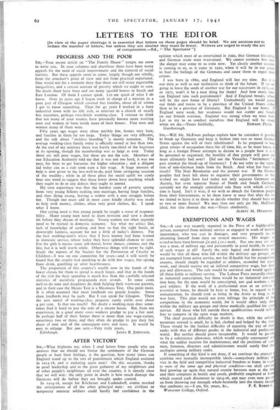LETTERS TO THE EDI FOR [In view of the paper
shortage it is essential that letters on these pages should be brief. We are anxious not to reduce the number of letters, but unless they are shorter they must be fewer. Writers are urged to study the art of compression.—Ed., " The Spectator "J PROGRESS AND THE POOR SIR,—Your recent article on " The Family House " tempts me anew to write you. In your columns and elsewhere there have been many appeals for the need of social improvement and the removal of social barriers. But these appeals seem to come, largely though not wholly, from the armchair's point of view and not from practical experience. One would not for a moment deny that there are still many regrettable inequalities, and a certain amount of poverty which we ought to cure. No doubt there have been and are many squalid homes in South and East London. Of them I cannot speak. Let me speak of what I do know. Over so years ago I began work in charge of a mission in a poor part of Glasgow which covered 800 families, about all of whom I got to know something. Then for 4o years I worked in a busy industrial town with no idle rich, as minister to a church of nearly Boo members, perhaps two-thirds working-class. I venture to think that not many of your readers have personally known more working men and women or been inside more of their homes. Fine men and women many of them were.
Fifty years ago wages were often terribly low, homes very bare, and families in them far too large. Today things are very different, and the talk about " reckless breeding " is mostly nonsense. The average working-class family today is officially stated at less than two. At the end of my ministry there was barely one-third of the baptisms at its opening, though the membership was as large as ever. Today there are still pcior wages, but these are not the rule. Members of our Education Authority told me that it was not too hard, it was too easy, for boys to get bursaries for higher education ; and a diligent lad today can as a rule soon earn a fair wage. A huge amount of help is now given to the less-well-to-do, paid from swingeing taxation of the wealthy ; while in all these pleas for social uplift we rarely hear one word to suggest that those lower down have anything which they ought to do or any defects they ought to amend.
My own experience was that the hardest cases of poverty sprang from very young fellows rushing into marriage, having large families, and then dying young, leaving a widow with a sore struggle before her. Though one must add in most cases kindly charity was ready to help with money, clothes, often very good clothes, &c. I speak what I know.
One crying need is that young people be taught a sense of responsi- bility. Many young men need to learn restraint and save a decent bit before they dream of marriage. Young women too often urgently need to be trained in domestic economy. Say what my critics like, lack of knowledge of cooking and how to buy the right foods, or downright laziness, account for not a little of today's distress. Far the best working-men's wives that I have known had been trained in domestic service, where today they have splendid chances to save. For the girls it means some self-denial, fewer dances, cinemas and the like, but it is well worth while. Otherwise things will never be right. Study the reports of the Society for the Prevention of Cruelty to Children—I was on one committee for years—and it will rarely be found that the cruelty had anything to do with low wages, but sprang from drink, gambling or utter heartlessness.
The proportion of this country's wealth now in the hands of the lower classes for them to spend is much larger, and that in the hands of the rich for their spending is much less than the carefully selected
statistics of socialistic propaganda ever reveals. In some cases well-to-do sons and daughters do shirk helping their worn-out parents, and in their case the Means Test is a Meanness Test. One point more. It is often assumed that most landlords are greedy harpies. Some slum landlords may be such. But I can speak for Glasgow. There the nett rental of working-class property rarely yields over about 4 per cent. Is that too much? No doubt a working-man does some- times find it hard to pay the rent of a decent house. But, from my experience, in a good many cases workers grudge to pay a fair rent. In perhaps half of their homes there is more than one wage-earner, sometimes two or three, anti they often do grudge to pay their fair share of rent and of the consequent rates and taxes. It would be easy to enlarge. But jam satis.—Very truly yours,






























 Previous page
Previous page